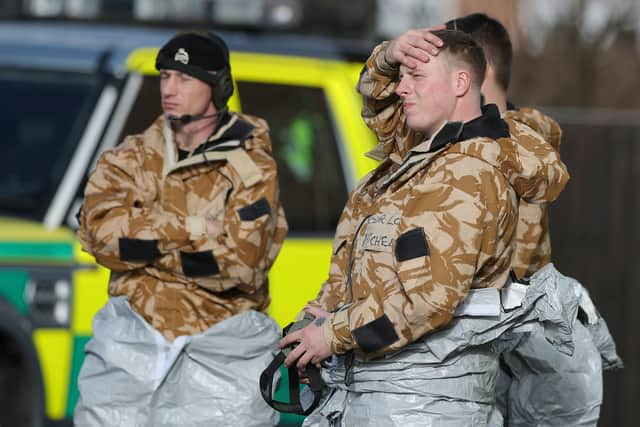1,200 military troops drafted to cover for Border Force and ambulance staff during December strike action
and live on Freeview channel 276
The government has said around 1,200 military personnel and 1,000 civil servants will be drafted in to cover striking ambulance and Border Force staff during Christmas strikes.
Around 10,000 ambulance staff will strike in England and Wales on 21 and 28 December over a pay dispute, and unions say military staff are not sufficiently trained to cover ambulance roles.
Advertisement
Hide AdAdvertisement
Hide AdHealth Secretary Steve Barclay said by bringing in military to cover strikes he is prioritising keeping patients safe, claiming the military is directed by the government to “serve the nation”. He also declined to get into “political debates”, according to the BBC.
Chief of Defence Staff Admiral Sir Tony Radakin said in an interview with the Sunday Telegraph that it’s perilous to expect military staff to cover public sector workers: "We’re not spare capacity. We’re busy and we’re doing lots of things on behalf of the nation - we’ve got to focus on our primary role."
The UK government is set to announce a new “resilience framework” on Monday (December 19), aiming to improve how the country prepares for and deals with critical situations like strike action. The Cabinet Office said it will "bring together all levels of government, critical national infrastructure operators, the private sector, charities and the public to bolster our national preparedness to these risks”.
The ambulance strike, a co-ordinated walkout by unions Unison, GMB and Unite, will only affect non-life threatening calls. But NHS bosses have warned hospitals in Wales and England to free up beds and prepare for “extensive disruption” on walkout days.
Advertisement
Hide AdAdvertisement
Hide AdThe government has said that there are “tried and tested” plans in place to reduce patient risks, and NHS trusts will be working with unions to agree on a safe level of cover, according to the BBC. But NHS Confederation chief executive Matthew Taylor says that despite government action, the strikes will affect patient safety.
"We’re in the middle of winter and we have a health service which, even on an ordinary day without industrial action, is finding it difficult to cope. So there are going to be risks to patients. There’s no question about that."


On the days of industrial action, some 600 personnel from the Army, Navy and RAF will be deployed to take on ambulance driving roles and 150 personnel will provide logistical support. The Welsh government has said that deployed military personnel will not be asked to drive ambulances.
Ticket sales for inbound flights halted at UK airports
As about 1,000 Border Force staff walk out on industrial action on December 23-26 and 28-31 at major airports such as Gatwick, Heathrow and Manchester, some airports have decided to stop selling new tickets for inbound flights on strike dates.
Comment Guidelines
National World encourages reader discussion on our stories. User feedback, insights and back-and-forth exchanges add a rich layer of context to reporting. Please review our Community Guidelines before commenting.
